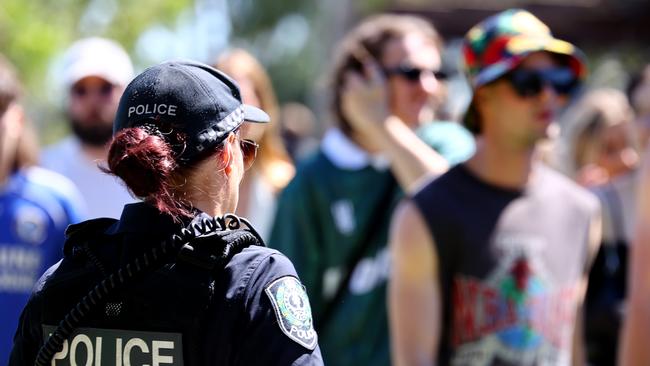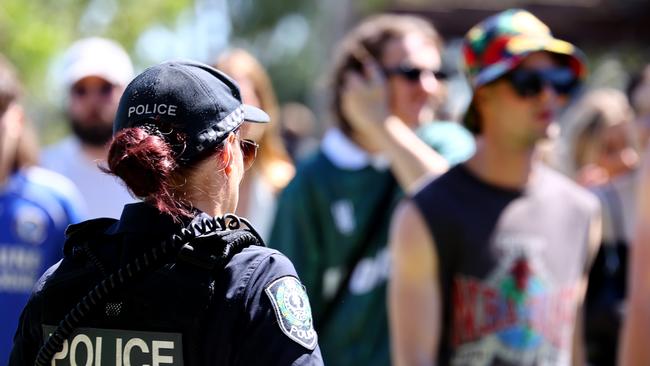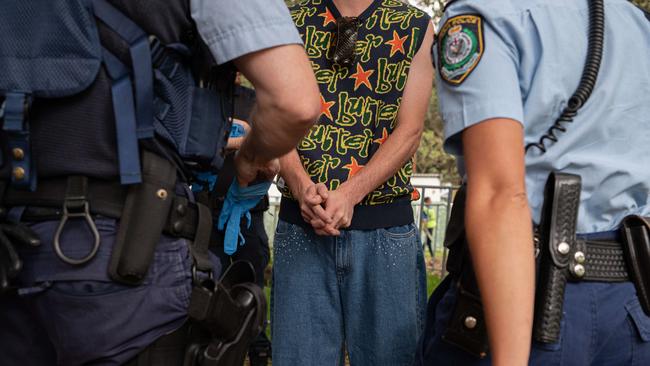‘Colossal magnitude’: Woman ‘wanted to scream’ during horror illegal strip search: court
A woman unlawfully strip searched at a major music festival “wanted to scream” in a “colossal” contravention of legal protections, a court has been told.

Music
Don't miss out on the headlines from Music. Followed categories will be added to My News.
A woman suing the state of NSW after she was subjected to an unlawful strip search at the Splendour in the Grass music festival was subjected to a “degrading and humiliating” experience “akin to a sexual assault”, a court has been told.
Raya Meredith is the lead plaintiff in the class action lawsuit and is representing more than 3000 people subjected to potentially unlawful police strip-searches at music festivals in NSW between 2016 and 2022.
The lawsuit, which has been brought by Slater and Gordon and the Redfern Legal Centre against the state of NSW, alleges unlawful searches were conducted by NSW Police, including on children, at multiple popular music events.
Ms Meredith’s lawyer, Kylie Nomchong SC, told the Supreme Court in her closing statements on Tuesday it was incumbent on NSW Police to train officers in relation to statutory guidelines around the use of searches.
She said NSW parliament had recognised that it is “highly invasive and humiliating trespass to the person in that conduct (a strip search)”, and that as such there were statutory legal preconditions for such searches.
“What will become manifestly clear is that there was a clear and unassailable failure on the part of the NSW Police Force to exercise any reasonable care and skill to ensure that police officers deployed to music festivals, including that which the plaintiff attended in 2018, were properly trained, and that is particularly so where we say there was a known expectation that strip searches would take place.”
Ms Nomchong said police had failed to “exercise reasonable practise in relation to both training and delivery”, which in the statement of claim was a “direct causes of police officers failing to comply with statutory powers”.

She went on to tell the court there had been a “critical failure” on the part of the state of NSW to call witnesses in regard to training modules on strip searches conducted by officers, or officers who briefed police that day.
Ms Meredith was subjected to what her lawyers told the Supreme Court was a “degrading and humiliating” experience “akin to a sexual assault” when she was made to strip by police at a Byron Bay music festival in 2018.
The court was told Ms Meredith was made to undress in front of a police officer for inspection and was also required her to remove her tampon – NSW Police later admitted in court in April that the search was unlawful.
Ms Meredith had come to the attention of police after a drug dog sniffed in her direction, but then walked on.
Nonetheless, police allegedly told Ms Meredith to remove her top in a makeshift tarpaulin cubicle at the site.
She was further made to move her breast and to bend over, before being instructed to remove her shorts and underwear while a police officer inspected her vagina and anal area. No drugs were found during the search.
Ms Nomchong told the court Ms Meredith, who had no criminal record, was assaulted and falsely imprisoned during the course of the search, which involved “a range of escalating and humiliating actions”.
Ms Meredith described to the court that it was unnecessary and “degrading” to be made to lift up her breasts, and that she was interrogated about “whether she had inserted anything” before being made to remove her tampon.
“I remember wanting to scream at her (the female police officer conducting the search). I remember feeling disgusted that another woman was putting me through this. I was nauseated by this point. I felt like vomiting,” Ms Meredith told the court.
Ms Nomchong went on to tell the court Ms Meredith, in her evidence, said she was “totally embarrassed and humiliated. She was angry, she was disbelief and she wanted to vomit” during the 30 minute ordeal.
Ms Nomchong is seeking $5000 in damages for the “pat down”, as well as aggravated damages because of the “colossal magnitude” of the contraventions made during the search, which was not lawful and “breached nearly every safeguard”.
For two and a half years, lawyers for the state of NSW maintained the search was lawful.
Ms Nomchong had told the court Ms Meredith had said she was “insulted (and) offended by the challenges to her honesty and integrity. She was enraged and infuriated.”
Ms Nomchong earlier told the court police reported 204 “cop events” were reported from the event, including the 143 people who were strip searched.
Describing the directions given to officers for the event as a “cut and paste job” from previous years, Ms Nomchong said officers not one police notebook “identified any consideration to what circumstances made a strip search necessary”.
“Not one of them considered whether – and if so what – there was any seriousness or urgency that rendered the strip search necessary” she said, adding that the notebooks also did not refer to any of safeguards under the law.
“The cops have produced for the Splendour in the Grass a range of reasons for suspecting possession of substances, but there’s one uniform feature of the 204 cops events that Your Honour has before you: not one a single cops events records what was necessary, not one a single cop event records the circumstances that made it sufficiently serious or urgent to conduct a strip search – not one.”
Ms Nomchong went on to add: “The only universal circumstance that appeared to warrant the strip search was that they were people attending a music festival where the use of illegal drugs had been a feature ion the past”.

She said police did not “turn their mind to anything” other than that there was a suspicion of drugs.
Ms Nomchong quoted a number of cop events reported by police, including of the 155 searches – including strip searches – in which nothing was found.
One person was searched after admitting to having joints tapped to their leg.
Another, to having alcohol – but was strip searched nonetheless.
Only one person was searched for allegedly intending to supply drugs, six where people volunteered to having concealed drugs.
Much of Tuesday’s evidence centred around what information had been supplied by police during the discovery phase of the lawsuit in regard to the training officers in searches and, specifically, strip searches.
Ms Nomchong told the court a 22-point plan had been developed following a complaint made about a search at an after-party for the 2013 Mardi Gras, but that it had been “siloed off” and not widely rolled out.
Another policy was stickers, which Ms Nomchong said could be placed on a police officer’s notebook and would allow them “tick off” when the necessary pre-conditions for a strip search had been met before commencing.
Nonetheless, Ms Nomchong said police had failed to record the grounds for the strip searches they were undertaking, resulting in a “high degree of laxity” which also made it hard for police to audit reasons for searches.
It was not clear whether police training material was mandatory.
Ms Nomchong told the court the number of police searches in NSW was decreasing, while the number of strip searches were increasing.
In 2016, police received 16 complaints regarding strip searches, followed by 14 complaints in 2017 and two in 2018.
The NSW Police Force also faced nine civil cases in 2016, seven in 2017, and five in 2018.
“It shouldn’t be for the NSW Police Force to be concerned about complaints. It should be that the NSW Police Force should be concerned about the prevalence of conducting unlawful strip searches against the citizens of NSW,” she said.
“It doesn’t really matter if there’s five complaints or six complaints. There’s no magic number about that. What there is is there’s a prevalence of strip searches being undertaken without compliance with statutory powers”.
Ms Nomchong said she would submit that NSW Police were “well aware” of problems surround strip searches prior to 2018, following an investigation by the Law Enforcement Conduct Commission into complaints.
The LACC described a “breakdown in knowledge transfer process” and at one point admitted the legislation was “open to interpretation”, though it was accepted a drug dog was not indication enough for a strip search.
The case will resume on Wednesday.
Originally published as ‘Colossal magnitude’: Woman ‘wanted to scream’ during horror illegal strip search: court


